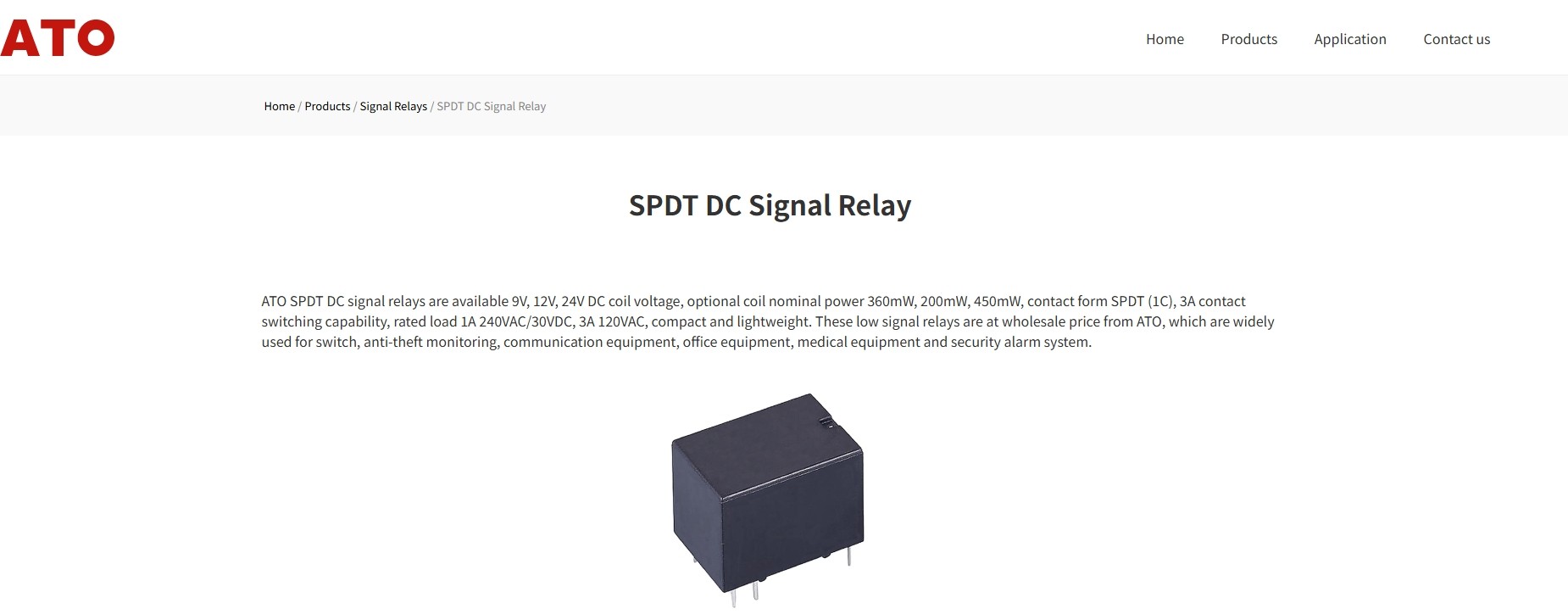

In the industrial electronics market, the SPDT DC Signal Relay has become a cornerstone for applications that require precise, reliable, and compact switching. For B2B buyers in the United States, the choice of a signal relay isn’t only about filling a slot on a board, it’s about ensuring stable performance in communication systems, medical devices, and security equipment where failure simply isn’t acceptable. Unlike heavy-duty power relays, an SPDT DC Signal Relay is engineered for low-level signals but delivers consistency and flexibility across a surprising range of uses.
Many engineers are drawn to SPDT DC Signal Relays because of their ability to balance compact size with switching strength. ATOrelays offers versions with coil voltages of 9V, 12V, and 24V DC, giving designers flexibility depending on their circuit requirements. Optional coil nominal power ratings—200mW, 360mW, and 450mW—make it easier to match the relay to the available drive current. The contact form SPDT (1C) means one device can manage two different switching states, and with contact switching capability up to 3A, these relays handle more than just lightweight tasks. Rated loads include 1A at 240VAC/30VDC and 3A at 120VAC, which opens up options for designers who need versatility without oversizing the relay.
In practical use, SPDT DC Signal Relays appear in office automation, telecom systems, and medical equipment, where compactness and accuracy matter. Security alarm systems depend on them for reliable signal transfer, and anti-theft monitoring systems require their steady operation to ensure alerts are never missed. American buyers are often frustrated by products that lack clear documentation, leading to mismatches and inefficiencies. They also face problems with signal relays that degrade quickly under frequent cycling, creating unnecessary replacement costs and downtime. These pain points highlight why reliable SPDT DC Signal Relays with well-defined specs are in demand.
What makes SPDT DC Signal Relays attractive is not only their technical precision but also their ability to solve real-world issues. They switch quietly and efficiently, which is an advantage in sensitive equipment where noise must be kept to a minimum. Their compact and lightweight design lets engineers conserve space in crowded enclosures. Low power consumption reduces strain on surrounding circuits, while the solid engineering behind these relays ensures a long service life, even in demanding applications. These traits help US buyers meet project deadlines and compliance standards without worrying about component failure.
For many companies, there are still unmet needs in the market. Some engineers seek relays with even broader coil voltage ranges to cover multiple designs with fewer part numbers. Others want more robust thermal performance in environments where heat is unavoidable. Buyers also value suppliers who provide transparent datasheets, responsive technical support, and consistent availability for bulk orders. ATOrelays addresses these demands by delivering SPDT DC Signal Relays with clear parameters, dependable construction, and pricing that makes sense for wholesale purchasing in B2B markets.
Ultimately, the SPDT DC Signal Relay is more than just a switching component. In security systems, it provides the trust that alarms will activate on time. In medical equipment, it delivers the assurance that life-supporting devices operate without interruption. In communications, it keeps signals flowing reliably. For industrial buyers in the United States, investing in well-specified, high-quality SPDT DC Signal Relays is not a small decision—it is an investment in safety, efficiency, and customer confidence. With suppliers like ATOrelays offering practical coil options, compact designs, and tested performance, businesses can focus less on component failures and more on building systems that last.


